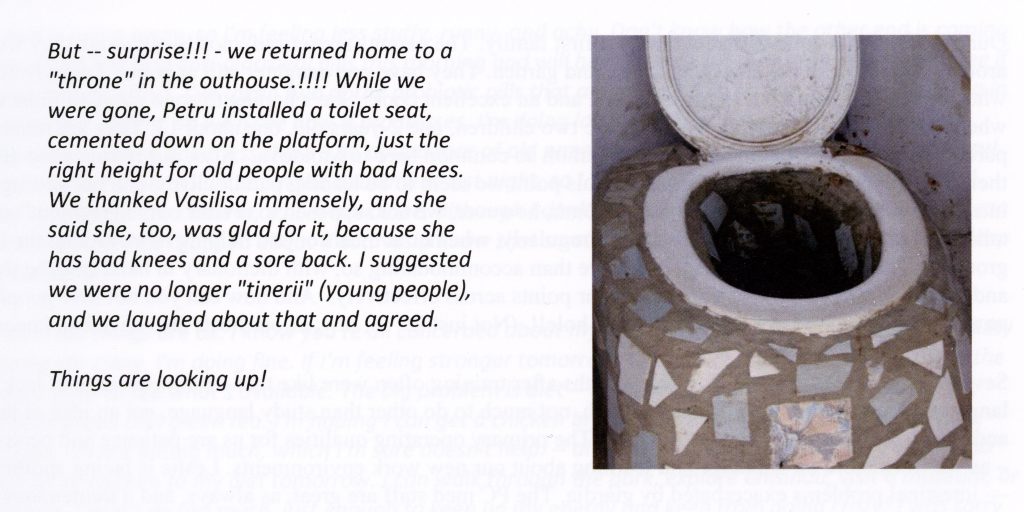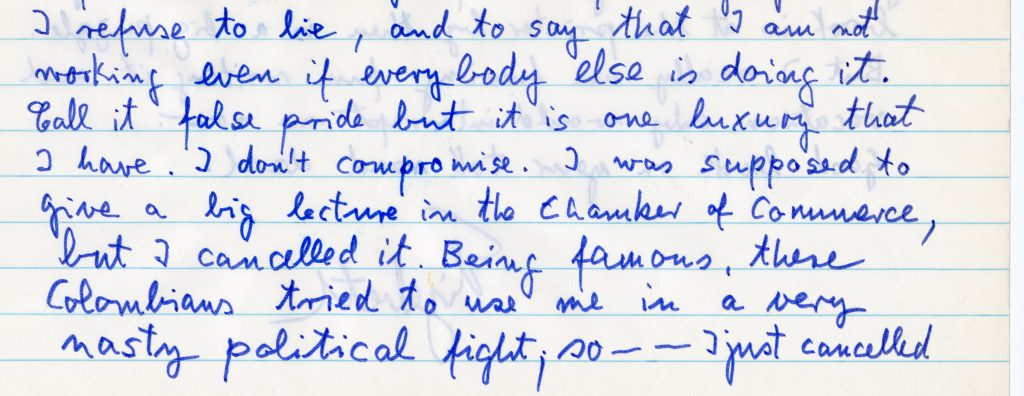Most Peace Corps Volunteers are recent graduates of college or university, but many volunteer after retiring. In fact, in Moldova 27, which left in 2012, there were “8 [volunteers] over 60 and an equal number in their 50s.”[1] The Peace Corps Community Archives holds the Elizabeth Krakauer collection, (Colombia, 1975-80) and the Jan and Leslie Czechowski collection (Moldova, 2012), all of whom retired before beginning foreign service. These tours of service were strengthened by the volunteers’ careers, experience, and their self-knowledge which enabled them to live a sustainable life in another country.
A sustainable lifestyle starts with physical comforts. The Peace Corps experience is infamously shy of creature comforts, but this is not the same as having one’s needs met. For example, after expressing their difficulty with the outhouse, Jan and Leslie wrote in their blog,
By asking to be accommodated, it was seen to that the Czechowskis could continue to serve in Moldova.
Comfort is also important in social situations. Many PCVs spent time with each other, but both the Krakauer collection and the Czechowski collection reflect a tendency to distance themselves from their younger counterparts. Leslie Czechowski writes,
Krakauer also kept a distance from her younger colleagues. She reflects, “I give in to my age and don’t participate in the drinking parties nor in the trips into a warmer climate during weekends.”[4] This reflects a reasonable preference for company of their own age.
Distance from the other PCVs was, in some ways, a boon to their service. Both Krakauer and the Czechowskis became closer with their coworkers and their host family. The Czechowskis write,
Spending more time with the hosts and less with other PCVs afforded them more time to enjoy Moldovan culture and to practice their Romanian. Likewise, Krakauer found new friends at the Biblioteca Nacional. She writes of her new house,[6] Rather than spending her time with the young PCVs, she spent her time and resources forging meaningful connections with her new colleagues. Preference for the company of their hosts and colleagues led Krakauer and the Czechowskis to become more integrated with life abroad.
Rather than spending her time with the young PCVs, she spent her time and resources forging meaningful connections with her new colleagues. Preference for the company of their hosts and colleagues led Krakauer and the Czechowskis to become more integrated with life abroad.
Further, these PCVs tended to be more assured of their beliefs and more prepared to meet people who held different culture and different opinions. For example, Krakauer was a liberal and Democrat, yet her colleagues tended to be more conservative. Her observational distance can be seen as she writes,
Her security in herself thus allows her to observe another culture without feeling threatened by it. However, volunteers were not mere political observers. In another letter, Krakauer explains the political games which would use her as a pawn;
This boundary Krakauer established allowed her to remain neutral in a politically charged and unfamiliar environment.
A final distinction of elderly volunteers is in the superior caliber of their work. For each, an entire career of experience informed their work abroad. Krakauer, especially, proved an excellent resource for work with rare books in the Bibliotequa Nacional. She was so successful that she was offered jobs, lecture opportunities, a book deal, and consulting positions in other Latin American countries. Such ephemeral projects are not typical to the Peace Corps, so Krakauer explained that the value of her work was in creating systems of knowledge.[9]
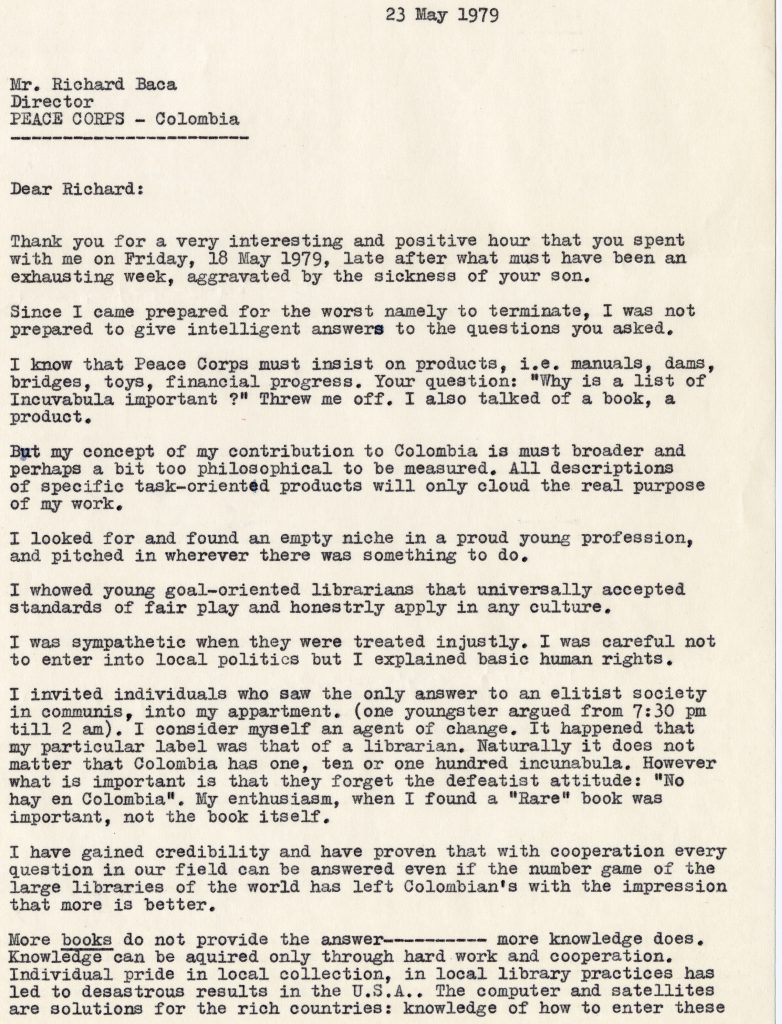
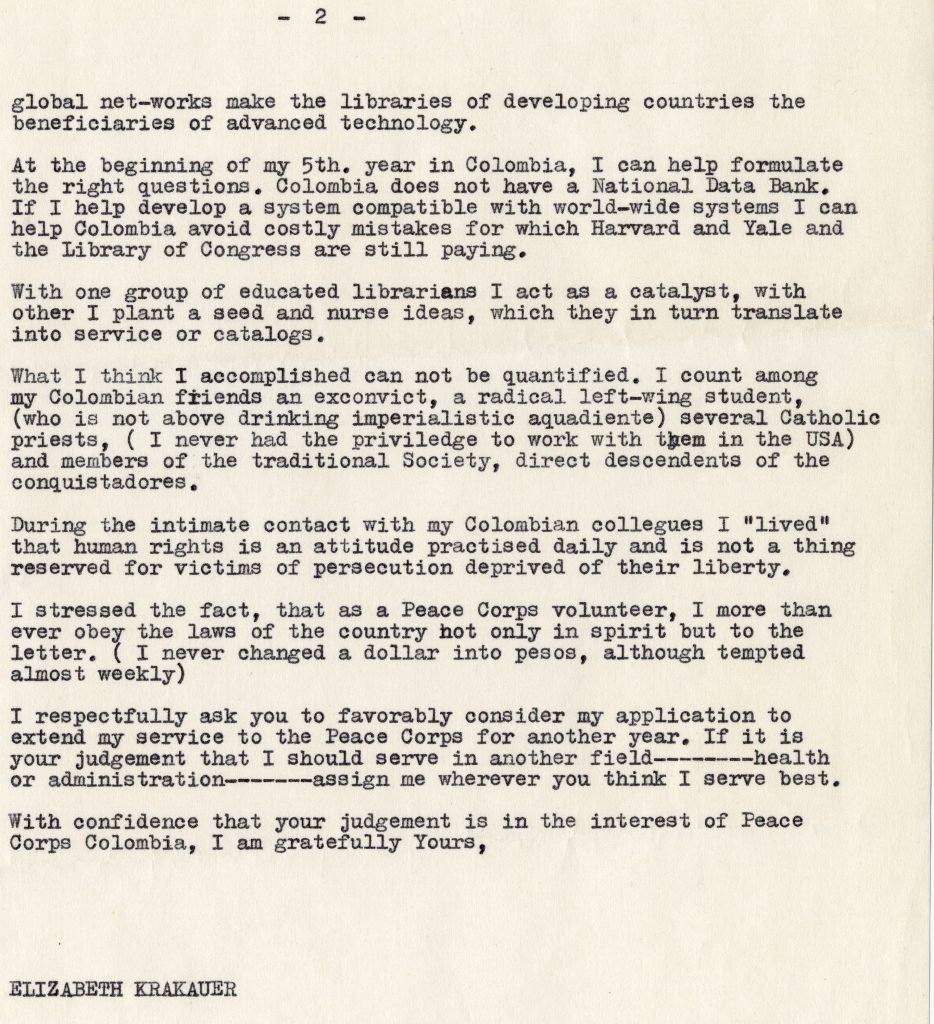
Though the Peace Corps administrators prefer quantifiable outcomes, the most important Peace Corps exports have always been qualitative. One favorite export has traditionally been the American Spirit,[10] but Elizabeth brought something with her much more important than ideals: experience.
Elizabeth Krakaurer’s and Jan and Leslie Czechowski’s service each lasted as long as possible, until they fell into chronic poor health. Krakauer ended her service after six years only when her progressive osteoarthritis disabled her.[11]
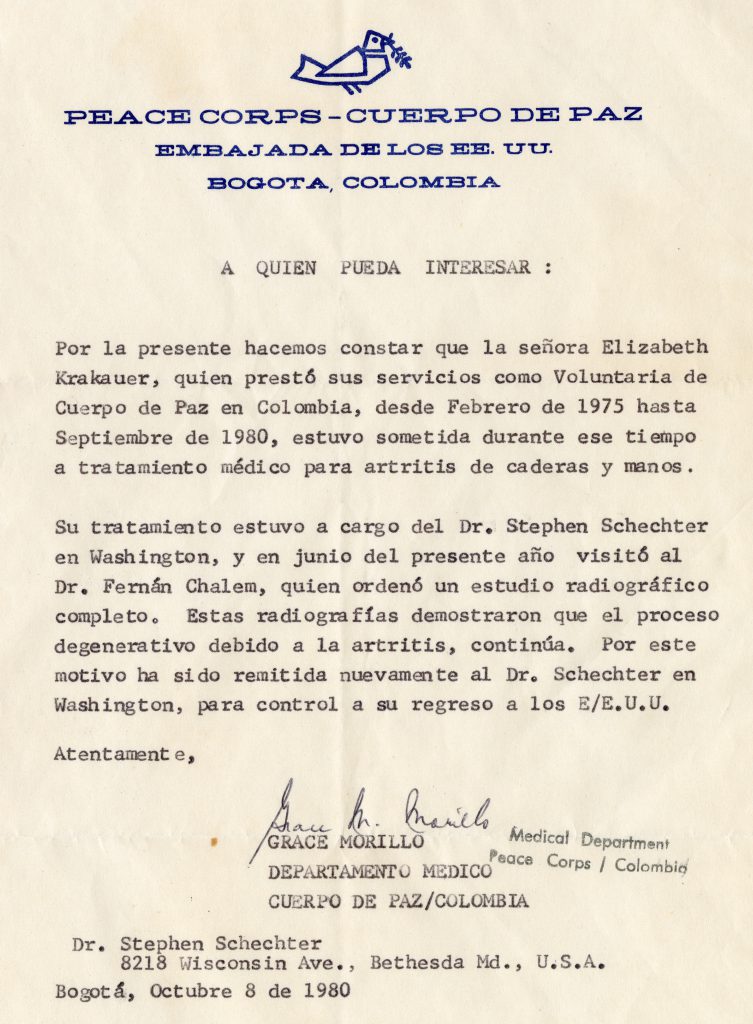
Leslie’s illness, too, ended her and Jan’s experience in Moldova. Jan writes,
This commitment to the Peace Corps is unmatched and shows incredible commitment to and care for their work and for other cultures. These volunteers embody the Peace Corps at its finest by engaging purposefully with their hosts and bringing meaningful change to another country.
[1] Jan and Leslie Czechowski, ~Musings From Moldova: Jan & Leslie report on their Peace Corps activities in Moldova 2012~ (Moldova) 13 June 2012. Peace Corps Community Archives: Mixed, Box 1, Folder 4: Czechowski, Jan and Leslie Moldova, 2012, American University Archives and Special Collections, American University Library.
[2] Jan and Leslie Czechowski, ~Musings From Moldova: Jan & Leslie report on their Peace Corps activities in Moldova 2012~ (Moldova) 14 August 2012. Peace Corps Community Archives: Mixed, Box 1, Folder 4: Czechowski, Jan and Leslie Moldova, 2012, American University Archives and Special Collections, American University Library.
[3] Jan and Leslie Czechowski, ~Musings From Moldova: Jan & Leslie report on their Peace Corps activities in Moldova 2012~ (Moldova) 1 August 2012. Peace Corps Community Archives: Mixed, Box 1, Folder 4: Czechowski, Jan and Leslie Moldova, 2012, American University Archives and Special Collections, American University Library.
[4] Letter, Elizabeth Krakauer to Curtis, 19 March 1975, Peace Corps Community Archives: Elizabeth Krakauer, Box 1, Folder 3: Elizabeth Krakauer Friends of Colombia, 1975-1980 Correspondence, 1975. Friends of Colombia Archive, American University Archives and Special Collections, American University Library.
[5] Jan and Leslie Czechowski, ~Musings From Moldova: Jan & Leslie report on their Peace Corps activities in Moldova 2012~ (Moldova) 13 June 2012. Peace Corps Community Archives: Mixed, Box 1, Folder 4: Czechowski, Jan and Leslie Moldova, 2012, American University Archives and Special Collections, American University Library.
[6] Letter, Elizabeth Krakauer to home, 6 June 1975, Peace Corps Community Archives: Elizabeth Krakauer, Box 1, Folder 3: Elizabeth Krakauer Friends of Colombia, 1975-1980 Correspondence, 1975. Friends of Colombia Archive, American University Archives and Special Collections, American University Library.
[7] Letter, Elizabeth Krakauer to Curtis, 23 November 1975, Peace Corps Community Archives: Elizabeth Krakauer, Box 1, Folder 3: Elizabeth Krakauer Friends of Colombia, 1975-1980 Correspondence, 1975. Friends of Colombia Archive, American University Archives and Special Collections, American University Library.
[8] Letter, Elizabeth Krakauer to Krakauers in California, 10 August 1980, Peace Corps Community Archives: Elizabeth Krakauer, Box 1, Folder 8: Elizabeth Krakauer Friends of Colombia, 1975-1980 Correspondence, 1980. Friends of Colombia Archive, American University Archives and Special Collections, American University Library.
[9] Letter, Elizabeth Krakauer to Richard Baca, 23 May 1979, Peace Corps Community Archives: Elizabeth Krakauer, Box 1, Folder 7: Elizabeth Krakauer Friends of Colombia, 1975-1980 Correspondence, 1979. Friends of Colombia Archive, American University Archives and Special Collections, American University Library.
[10] Sargent Shriver, The Peace Corps (Washington: Peace Corps) Peace Corps Community Archives: Gail Wadsworth, Box 1, Folder 1: Application Materials Uganda 1970-72, American University Archives and Special Collections, American University Library.
[11] Letter, Grace Morillo to Peace Corps Colombia, 8 October 1980, Peace Corps Community Archives: Elizabeth Krakauer, Box 1, Folder 8: Elizabeth Krakauer Friends of Colombia, 1975-1980 Correspondence, 1979. Friends of Colombia Archive, American University Archives and Special Collections, American University Library.
[12] Jan and Leslie Czechowski, ~Musings From Moldova: Jan & Leslie report on their Peace Corps activities in Moldova 2012~ (Moldova) 3 November 2012. Peace Corps Community Archives: Mixed, Box 1, Folder 4: Czechowski, Jan and Leslie Moldova, 2012, American University Archives and Special Collections, American University Library.

